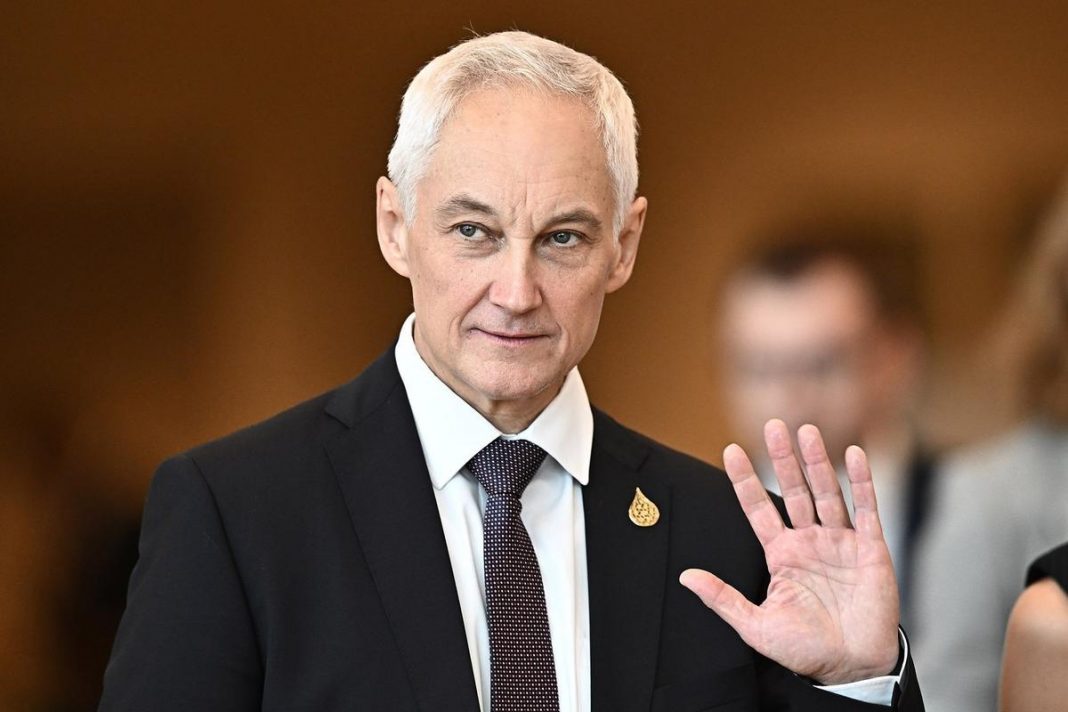Andrey Removich Belousov was born in Moscow on March 17, 1959, in the family of the famous Soviet economist Rem Belousov (1926 – 2008). Rem Belousov served in the Great Patriotic War in the aviation forces, graduated from MGIMO and defended his PhD in economics. Later, he worked at the Research Institute of the State Planning Committee of the USSR, was the head of the department at the Academy of Social Sciences under the CPSU Central Committee, was the founder of the Soviet scientific school in the field of pricing and management, and was one of the participants in the preparation of the “Kosygin reform”. Mother, Alisa Pavlovna (1934 – 2015), nee Travnikova, was the daughter of the famous Soviet agronomist and gardener Pavel Ivanovich Travnikov (1908 – 1985). Alisa Pavlovna was a radiochemist and later studied rare elements chemistry. In addition to Andrei, the family grew up with a younger brother, Dmitry, who later became an economist and is now a leading expert at the Center for Macroeconomic Analysis and Short-Term Forecasting (TsMAKP).
“The environment influenced our choice; our father did not pressure us. My father was rather private, but he instilled in us a culture of problematic conversation and thinking. In addition, his friends who appeared at our house were quite substantial people; the most public of them was Valentin Falin (a reference to Khrushchev and Gromyko),” Dmitry Belousov later said.
This Content Is Only For Subscribers
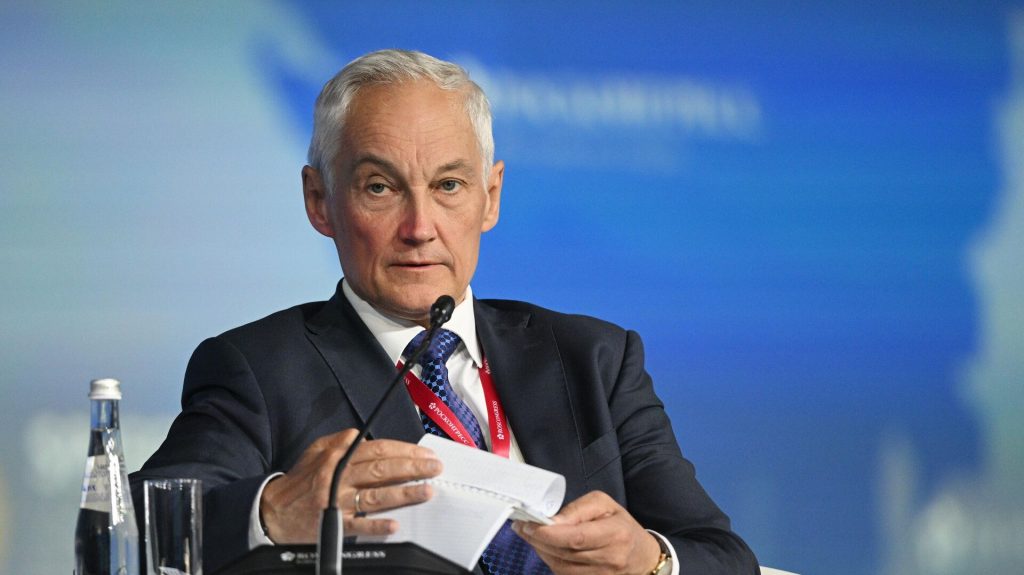
After graduating from the Second School of Physics and Mathematics, Andrey Belousov entered the Faculty of Economics of M.V. Lomonosov Moscow State University, from which he graduated with honours in 1981. During his studies, he began to collaborate with a group of economists under the leadership of Alexander Anchishkin, who, from 1977 to 1981, was the head of one of the departments of the Faculty of Economics.
After receiving a higher-education diploma, Andrey Belousov continued his graduate studies at the Central Economics and Mathematics Institute of the USSR Academy of Sciences (CEMI). At the same time, he began his scientific career there, first as a research intern, then as a junior researcher in the laboratory of modelling human-machine systems at CEMI, headed by E. B. Ershov. The position of Deputy Director of CEMI was held by Yuri Yaremenko (who became an academician of the Russian Academy of Sciences in 1994). Yaremenko became the mentor of the young Belousov. He studied in the People’s Republic of China and was considered a keen expert on Chinese culture. According to Dmitry Belousov, Yaremenko liked to utter the following phrase, which is entirely consistent with the spirit of Confucianism: “A true man has only two activities – observing nature and serving the state.”
In February 1986, based on several scientific departments of CEMI, the Institute of Economics and Forecasting of Scientific and Technological Progress (IEPNTP) of the USSR Academy of Sciences was formed. The institute’s main activity is economic forecasting. Belousov went to work at the Institute of Economics and Technology of the USSR Academy of Sciences, where he successively held the positions of junior researcher, researcher, and senior researcher. His research priorities focused on forecasting macroeconomic trends, inflation, and structural crises in Soviet-style economies.
In 1988, Belousov defended his thesis “Simulation Modelling of Mechanisms for the Formation and Use of Working Capital (Multi-sectoral Approach).” Three years later, in 1991, he was appointed head of the laboratory at the Institute of Economics and Technology of the USSR Academy of Sciences, replacing E. B. Ershov. Belousov held this position until 2006, combining it with work in other organisations, and only vacated it by moving to the public service. On Belousov’s initiative, an analytical journal on economics was published at the laboratory.
In November 1991, an analytical group of the Foreign Policy Association was formed, sometimes called the “Group of Immortals” (after the name of its founder, ex-Minister of Foreign Affairs of the USSR, Alexander Bessmertnykh). The format of its work is the organisation of regular thematic discussions. Subsequently, the transcripts are transcribed and become the subject of deeper study and, in some cases, used as the basis for scientific works. Belousov joined the Immortal group in the early 1990s and took part in developing several topics.

Ogonyok magazine wrote in 2013: “In 1991, the former ambassador to the United States and ex-head of the Foreign Ministry Alexander Bessmertnykh, under the auspices of the Foreign Policy Association, founded a dialogue platform for experts of various kinds, ironically nicknamed the “Group of the Immortals.” At the round tables, the so-called analyst’s various topics from political, economic and international life were discussed (for example, “Organised crime as a way of life and as a factor in the foreign and domestic policy of Russia”, “Imperial pendulum in Russia”, etc.). The participants in the “analyst” were various scientists and thinkers, many of whom were and are prominent characters in the public field – Simon Kordonsky, Vadim Radaev, Vyacheslav Glazychev, Sergey Kurginyan, Andrey Kuraev… And the main economic expert in their circle was Andrey Belousov, with whom his classmate and future deputy at the Ministry of Economic Development Andrey Klepach actively worked.”
Alexander Bessmertnykh recalled: “In the early 1990s, it was necessary to recognise the difficulties that market Russia had faced and would still face. Andrey Belousov was and remains an excellent forecaster. He has the rare ability to forecast macroeconomic trends while simultaneously conducting short-term market analysis. His authority was unquestionable. He already proved then that he possesses another rare quality for a scientist-economist – he is able to adequately translate thoughts into words. It’s not surprising that the president appreciated him.”
Since 1999, Belousov has been a member of the Ministry of Economy board and a consultant to several prime ministers: Evgeny Primakov, Sergei Stepashin, Mikhail Kasyanov, and Mikhail Fradkov (he worked with Kasyanov and Fradkov as a freelance adviser).
In 2000, Belousov founded and headed the Center for Macroeconomic Analysis and Short-Term Forecasting, based on which he published the report “Long-term Trends in the Russian Economy: scenarios for economic development of Russia until 2020.” In his report, Belousov predicted the economic crisis of 2008 and also pointed to a possible economic decline in 2011-2012 and a failure of the public administration system in 2015-2017.
On February 8, 2006, Belousov joined the public service. At the invitation of the Minister of Economic Development of the Russian Federation, German Gref, he became his deputy. At the same time, he resigned from all other positions (E. A. Abramova became the successor to the position of General Director of TsMAKP).
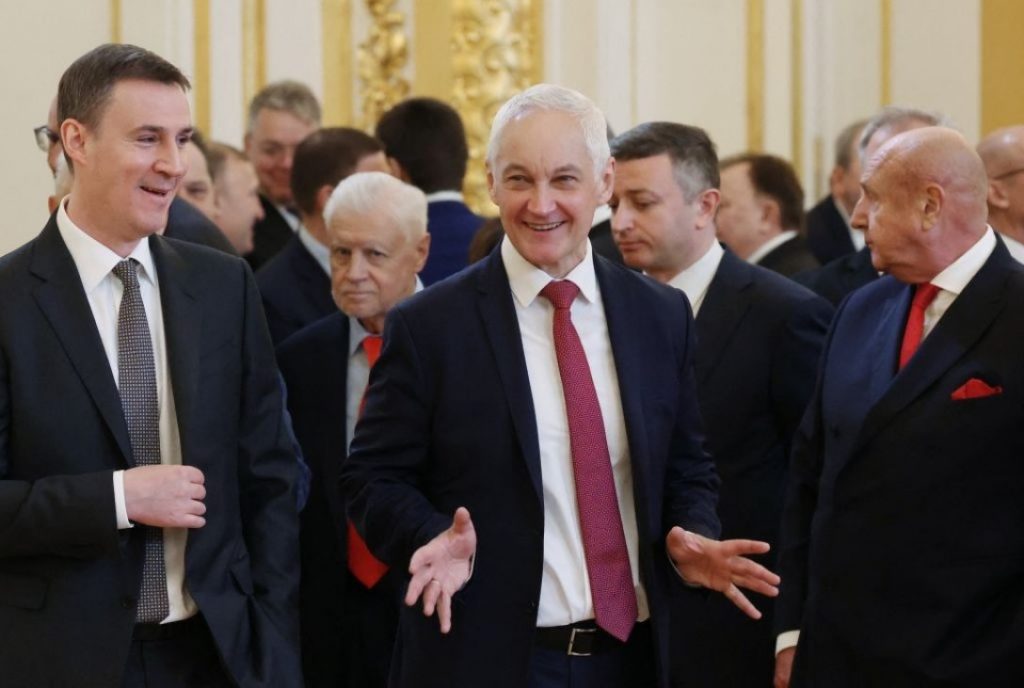
The famous economist Evgeny Gontmakher, deputy director for scientific work at the Institute of World Economy and International Relations, wrote about Belousov: “He, of course, is a man of the system and some even call him a dirigiste, which is why Belousov turned out to be necessary for power. However, the important thing is that he is a professional in economics. This is not Rogozin. And if Belousov says that the economy should be regulated, he knows how to argue his position and listen to the opinions of his opponents. On the other hand, it is also true that he is not a professional politician, so it is not so easy for him to lead his course.”
In the same year, Belousov received a Doctor of Economics degree, defending his doctoral dissertation “Contradictions and prospects for the development of the reproduction system of the Russian economy.”
At the Ministry, Belousov oversaw the macroeconomic block, including improving the investment climate, implementing federal target programs, and managing Vnesheconombank’s investment activities. Under his leadership, the Concept of Long-Term Social and Economic Development (CDR-2020) and the bill “On Trade” (adopted on December 28, 2009) were developed.
In 2007, when Gref left the Russian Ministry of Economic Development, Elvira Nabiullina, who had previously held the position of deputy minister, was appointed minister. Belousov retained his post, and then, on July 17, 2008, he was promoted to the Government of the Russian Federation: Prime Minister Vladimir Putin appointed him director of the Department of Economics and Finance of the apparatus of the Government of the Russian Federation. Shortly before this, in the summer of 2007, Belousov received the title Honored Economist of the Russian Federation.
From 2008 to 2012, First Deputy Prime Minister of the Russian Federation Igor Shuvalov, Belousov, and Elvira Nabiullina were responsible for shaping the Russian government’s economic agenda.
In the Government of the Russian Federation, Belousov was responsible for budget formation, public investment, and improving the investment climate. Under him, the Agency for Strategic Initiatives was created and the so-called “National Entrepreneurial Initiative” was launched on its basis, aimed at improving the conditions for doing business in Russia.
In May, the State Duma, on the proposal of the newly elected President Putin, approved Dmitry Medvedev as Chairman of the Government of the Russian Federation. After some time, a new cabinet of ministers was announced: Belousov was appointed to the post of Minister of Economic Development of the Russian Federation. At the same time, according to media reports, Belousov was also considered an assistant to the President of the Russian Federation on economic issues. Still, then a decision was made to appoint Elvira Nabiullina to this post.
Having become Minister of Economic Development in 2012, Belousov promised to improve the business climate, optimise the management of state property, and work on the public functions of the ministry. Success in all areas was relative. On the one hand, Russia rose in the World Bank’s Doing Business ranking from 120th to 112th; on the other hand, this happened mainly due to formal improvements, but in reality, life for entrepreneurs is worse than ever. Belousov’s brainchild, the Agency for Strategic Initiatives, has not generated a single significant initiative since its launch in 2011. Even if the ex-minister had an idea of what he should do for the good of Russia, the result is obvious: he failed to work effectively during his ministerial year.
On June 24, 2013, Belousov was appointed Assistant to the President of the Russian Federation (on economic issues), replacing Elvira Nabiullina, who had left for the post of head of the Central Bank of the Russian Federation. “The current inactive government was not a suitable institution for Belousov. He should feel more comfortable in the Presidential Administration. Today we do not have a state consensus on basic economic issues, and Belousov will look for it. He wants to be heard by his colleagues and the authorities, so he is suitable for the role of a negotiator. He does not have a clear description of his functions, but the presidential assistant will clearly influence where to spend the funds available to the state and where to get them from. Belousov, of course, disagrees with Putin’s old entourage, people who represent corporations fused with the state. Their economic strategy is quite expensive, but Andrey still wants to spend money on development. Hence the question: will he be able to defend his views,” said political strategist Gleb Pavlovsky in those days.
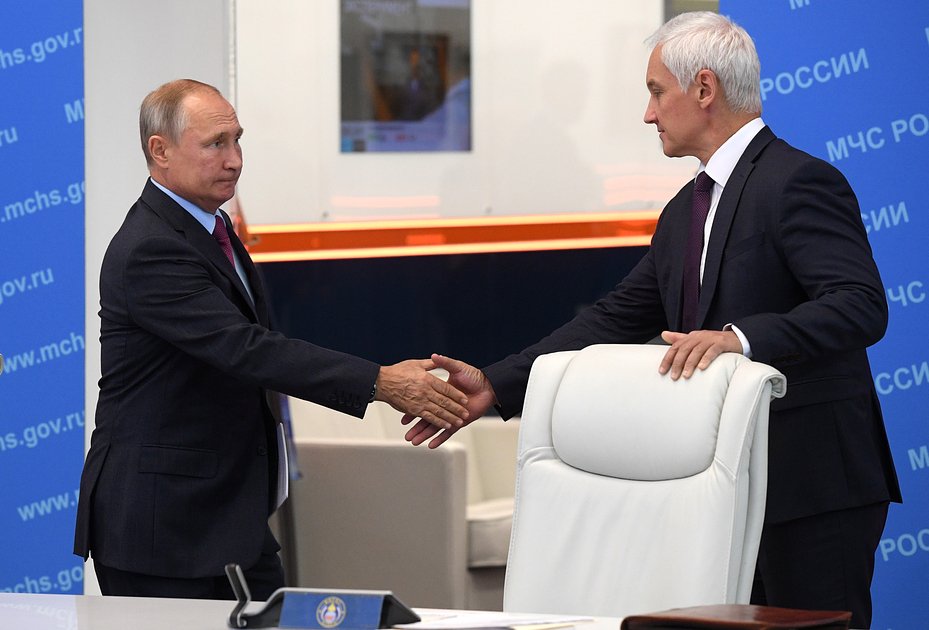
Moreover, in the Administration, Belousov had to work closely with Sergei Kiriyenko, with whom close ties had been established since the time they worked together at Rosatom (from 2007 to 2012, Belousov was a member of the supervisory board of Rosatom). In 2018, as an assistant to the President, Belousov proposed seizing more than 500 billion rubles from petrochemical, chemical and metallurgical companies to implement the “May Decree”, which he was called the author of. Nevertheless, businesses managed to fight back.
From June 17, 2015, to September 29, 2017, Belousov was the Chairman of the Board of Directors of PJSC NK Rosneft. At this moment, Belousov became close to Igor Sechin, and they began to talk about him as a representative of the “Sechin” team. However, at the same time, he was associated with Rotenberg, Deripaska, and Patrushev. This testifies to Belousov’s flexibility and refined hardware sense.
In October 2017, Belousov sought the appointment of Andrey Nikitin, who was close to him personally, as governor of the Novgorod region. Then they were already talking with all their might about Belousov’s special influence on the economic policy of the state and that Putin was increasingly listening to Belousov’s advice. Andrey Removich began to be named among those who applied for the post of head of the Government – instead of Medvedev.
On January 21, 2020, Andrey Belousov was appointed First Deputy Prime Minister of the Russian Federation in the new Government of Mikhail Mishustin. In the Russian media, the Government was immediately dubbed the “government of Mishustin and Belousov”, the “conservative government”, and the prime minister and first deputy prime minister themselves were dubbed “Digital Stolypin” and “Russian Keynes”.
One of the sources reported: “First Deputy Head of Government Belousov is closely connected with Deripaska. Before joining the Government, Belousov worked for Deripaska and even received bonuses from him. According to several sources, Belousov maintained relations with Deripaska and, through him, with the Yumashevs and Voloshin. Belousov repeatedly lobbied for the interests of Deripaska’s businesses. It is known that Belousov supports Deripaska in his conflict with Nabiullina and the Central Bank. In addition, Belousov himself has always been critical of the work of the Ministry of Finance. Belousov has good contacts with the Rotenbergs. They worked together on the ASI project, which was seen as an alternative to “mobilisation modernisation.”
Since March 2020, Belousov has been Chairman of the Board of Directors of Russian Railways OJSC. From April 30 to May 19, 2020, he acted as Prime Minister of the Russian Federation in connection with Mikhail Mishustin’s leave of absence due to COVID-19. While temporarily at the head of the Government, Andrey Belousov ordered to “optimise the number of development institutions” – numerous funds, state corporations, capital raising agencies and other government and budget-burdened structures. With this, he dealt the first blow to the structures of the liberals, who powerfully latched on to state funds under Dmitry Medvedev.
Meduza noted that Belousov is one of the few Russian officials who has adhered to the same economic and ideological doctrine for twenty years. From his point of view, the state can manage the economy, guided by the principles of intersectoral balances, redistributing resources between sectors.
Belousov’s primary opponent in the Government was Anton Siluanov (until January 2020, First Deputy Prime Minister, whom Belousov replaced; at the same time, Siluanov retained the post of Minister of Finance). Evgeny Minchenko wrote: “Siluanov belongs to the group of liberal monetarists, whose ideal, as they have repeatedly emphasised, is to reduce state participation in the economy to a minimum. Belousov supports soft state regulation of the economy, relying on state corporations and strategic planning. These theoretical differences, however, can have very tangible material consequences. Belousov redirected cash flows in favour of scientific centres that he trusted – ASI, academic institutes and others. Accordingly, the National Research University Higher School of Economics, the Gaidar Institute, the Russian Academy of National Economy and the State University – traditional centres of liberal recommendations, which for decades have been carefree on state funding while actively promoting the advantages of private property – may lose considerable funding, amounting to tens of billions of rubles. The time has come to check the effectiveness of their work, like many other liberal sinecures: from Rusnano with their fantastic incomes and nano-returns to Skolkovo and various sociological and near-government funds. This is where everything is heading, judging by Belousov’s statements and draft analytical note to the Security Council and the Presidential Administration.”
An informed Ascolta source reported: “Belousov has a powerful administrative resource, as he conditioned his agreement to take the position of curator of national goals with several direct powers. Supported by representatives of high-tech industries, the defence complex and oil refining. Outside the government, he relies on Nikolai Patrushev, Igor Sechin, Sergei Chemezov, and Vitaly Savelyev (Aeroflot). Situationally, he can count on an alliance with the rather independent Deputy Prime Minister Yuri Borisov and the Minister of Industry and Trade Denis Manturov. However, it is fundamentally unacceptable for the liberal group of Kudrin-Gref-Nabiullina-Shuvalov and the oligarchy associated with them. Difficult relationship with the influential Anton Siluanov, whom he replaced as first deputy prime minister. Siluanov pointedly, as a rule, ignores government meetings on national goals held by Belousov, sending his deputy Vladimir Kolychev, as happened on September 5.”

The telegram channel “Kremlin Reckless” characterised Belousov this way: “Belousov is known as a supporter of stricter government regulation, an ideologist of the mobilisation model, government procurement, share the income. Technological. He knows how to divide into friends and foes. He doesn’t like oligarchs, ancient regime ones. His new status will have a decisive impact on the formation of the strategic plan. But without any liberal idea.”
However, he immediately wrote: “Some time ago, we were the first to investigate the interesting connections of Fonbet, a bookmaker company behind which is our old friend Andrey Removich Belousov. Now, in addition to connections with the guys from the 90s – such as “Luchok” Lalakin, a line with the “fixer” Burtakov has also emerged, the true beneficiaries have also been revealed in the person of Alexey Khobot, the daughters of the founder of Fonbet Anatoly Machulsky and, again, Alexander Burtakov, whose interests Belousov represents him in the government.”
On July 30, 2020, the Ministry of Economic Development published a draft Plan for implementing regulatory legal acts by federal authorities for 2021. This purely departmental document contained a revolutionary proposal that could give the Russian economy a powerful impetus for development, freeing it from the need to serve primarily the interests of the raw materials oligarchy. The government proposed introducing a single turnover tax, calculated at 6.2% of revenue. The new tax should replace VAT (20% rate on revenue), profit tax (20% rate on profit), personal income tax (13% rate on the wage fund), insurance contributions to funds (30% rate on the wage fund), property tax (no more than 2.2% of the average annual value of property).
The rationale is simple – the tax code requires equality in taxation, but the current fiscal scheme does not. The tax burden on enterprises in different industries (and on the employees of these enterprises) differs significantly, in many cases by several times. The document also provides examples of such inequality. MUP Ukhtavodokanal and LLC Ukhtazhilfond pay 27.1 and 24.6 per cent of taxes, respectively. “Perm Motors” -23.8 per cent. But PJSC Lukoil – 6.2, PJSC Transneft – 6.1 percent. In other words, mining companies with relatively small production assets and receiving raw materials produced free of charge by the earth are in a clearly more privileged position than high-tech companies with a high level of added value.
This does not stimulate the development of the economy towards digitalisation and new socio-technological structures. The new tax is designed to strategically correct this situation by leveling payments in favor of the production of new technologies and modern competitive products without losses to the budget.
This is an old idea by Andrey Belousov, who, as an assistant to President Vladimir Putin, already proposed something similar when, in 2018, he justified the need to “voluntarily-compulsorily” oblige the largest chemical and mining and metallurgical companies to help the budget with 500 billion rubles to implement the May decrees on economic reform. Predictably, a powerful lobbying campaign has been launched to counter the innovation, which requires legislative changes to the Tax Code.
The Kommersant newspaper wrote, “Andrey Belousov is, without a doubt, one of the key architects of not only the meanings but also the matrix of the Government’s work along the trajectories of national projects.”
The Telegram channel “The Grashchenkov” claimed: “Belousov initially played a more important role in Mishustin’s cabinet than the prime minister himself. One of the most important tasks facing the “Mishustin cabinet” is to ensure the transfer of large assets from the hands of the “oligarchs” remaining in the country into the hands of representatives of the so-called. “state business” (inner circle). All this is connected with the need for further and final nationalisation of the country’s economy in the context of the difficult foreign policy situation in which Russia finds itself – it is not without reason that the “statist” Belousov was appointed first deputy prime minister in Mishustin’s “cabinet” responsible for the economy. So now the remnants of the oligarchy will have to strengthen further their contribution to the cause of “economic recovery.” As you know, not so long ago, Belousov, while still a presidential assistant, put forward the idea of “withdrawing” from the “oligarchs” part of their financial savings to invest them in the economy and, above all, in the development of the industry. In January, Putin decided to invigorate the economy by replacing some of the low-energy and ageing “caretakers” behind it with more energetic and younger “tops,” as if tired of corruption. Therefore, the formation of the “Mishustin cabinet,” political and not technical, meant “a fundamental change like the current political regime in Russia, even though “Mishustin’s cabinet” is Putin’s next Government, no matter who is in it. All these people are lobbyists and objects of lobbying of other people around Putin. Therefore, Mishustin’s illness and Belousov’s arrival will change a little strategically. The course was set back in January; it is possible that the situation with the corn crisis and the fall in oil prices accelerated plans for the transition to a new type of economy (the author of which was Glazyev-Belousov).”
By the end of the summer of 2020, Belousov entered into a confrontation with another strong player – Deputy Prime Minister of the Government for Social Policy Tatyana Golikova, through her husband (former Deputy Prime Minister Viktor Khristenko) connected with the most influential business circles in Russia).
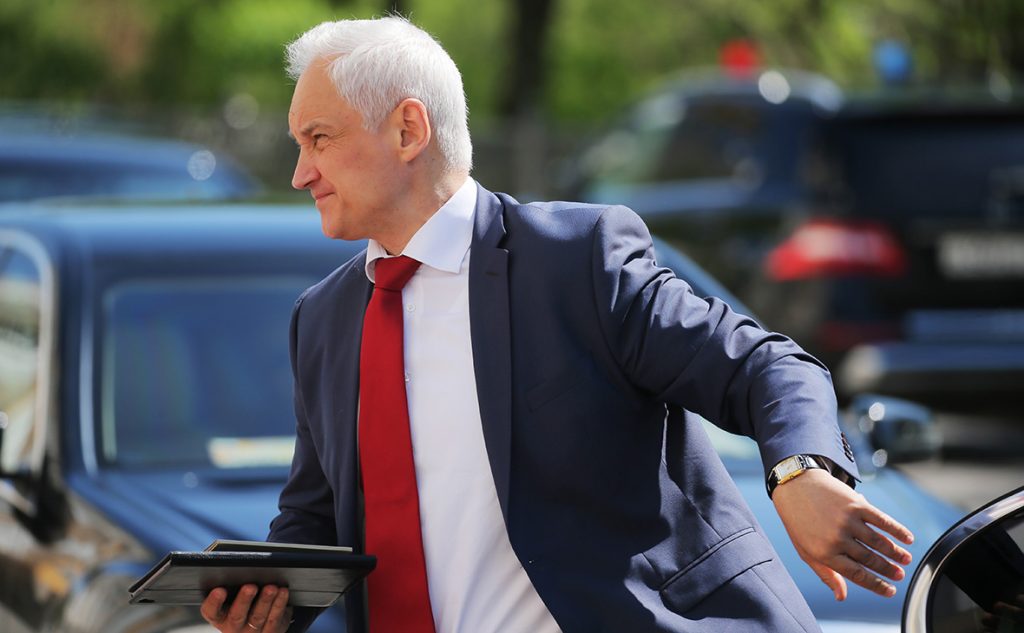
The Telegram channel “Near the Kremlin” wrote (obviously without sympathy for Belousov): “First Deputy Prime Minister Andrey Belousov is already beginning to lose in the apparatus struggle within the Government. Belousov, despite all instrumental attempts, was never able to gain control over the Ministry of Finance and the budget process. In addition, control over the implementation of national projects was also passed to Mishustin’s team.
Khusnullin will take over all the construction, and the VEB and Rotenberg Ponton project (the creation of an infrastructure contractor based on Mostotrest, the Mosenergo fuel and energy complex and the 1520 Group) will be, in terms of its margins, the most delicious part of the pie of infrastructure national projects. Khusnullin is directly focused on the Rotenbergs. Behind him are the regions, renovation, construction and Crimea.
According to several people from big business, “Belousov was always not a top organiser. And suppose in the Presidential Administration, it was possible to steer the processes without being formally responsible for anything and attributing their mistakes to the curators and implementers of national projects. In that case, such a story will not work in the Government.” It is known that Belousov was sent to serve as a commissioner in the Government but was not given the authority to manage finances.
In addition, with the appointment of Victoria Abramchenko pushed through by Belousov, “many problems arise.” According to an employee of the Government Office, “officials knew that at the end of last year, they planned to dismiss Abramchenko from the post of head of Rosreestr as a very ineffective leader. The level of corruption and incapacity of her department was prohibitive. There was talk that one of the previous ministers was forced to give a bribe to the Moscow region branch of Rosreestr to prepare the necessary documents. And this despite his introducing himself by position and rank.”
The current Mishustin scheme is too conflicting and suits few people. It turned out that two clans – the Kovalchuks and the Rotenbergs – divided the Government and resources, effectively leaving other influential players behind. And this creates real problems for the stability of the System.”
However, Belousov was not going to give up or lose. On September 5, 2020, Belousov presented the “Unified Plan for Achieving National Development Goals” developed by a group of economists.
“Kommersant” wrote: “There was no sensation, and the hopes that may have been pinned on the Mishustin-Belousov government, hoping to finally receive a systematic strategic planning document in the form of a “Unified Plan to Achieve National Goals…” have not yet been justified. With some novelty of composition and terminology, with one exception, it repeats similar developments of the authors of the concepts “Strategy 2010” and “Strategy 2020”, which brilliantly failed and were happily forgotten, like the trillions of rubles spent on them.
Andrey Belousov defined GDP growth at 3-3.2 per cent. These figures do not guarantee rapid, outpacing Chinese-style growth, but they at least make it possible to keep up in the global race.
Population growth, taking into account 368 thousand imported migrants, will be 126,600 people by 2030. In the previous period, year by year, starting from 2020—from minus 81,500 to 67,600, or a maximum of 0.1 per cent of the total labour force. Consequently, it is impossible to maintain three per cent of GDP growth yearly by increasing the number of workers. It is necessary to increase labour productivity, including robotising and digitising the economy and stimulating the development of industries with a high level of added value.
In the meantime, the density of robotisation in Russia is five robots per 10 thousand employees, with the world average being 99 (in China 140, in Germany 338). Meanwhile, robots significantly increase labour productivity. And, if labour resources are limited, then the only way is to intensify robotisation by any means, as happened in Singapore (density – 831). However, the Plan did not pay attention to robotisation.
The situation is similar with information technologies, which are also capable of increasing productivity: according to the Accounts Chamber, 300 billion rubles were wasted on creating information systems for federal departments; the activities of these organisations have not fundamentally changed.
And the last, 5th section of the “Plan…”, entitled “Digital Transformation” does not bring clarity and does not inspire optimism, reducing digitalisation to a set of services and expansion of Internet traffic.
In the supervised section “Decent, effective work and successful entrepreneurship,” the First Deputy Prime Minister laid down maximum support for systemically essential enterprises, primarily with a high added value. The main idea around which almost all of the section’s indicators are built is the need to develop the real sector of the economy, material production, while at the same time restructuring it structurally in favor of export and high-tech industries. At this stage, Belousov envisaged measures to overcome the shortage of working capital organised by his monetarist predecessors in the manufacturing industries of the final production cycle. It is planned to implement a lending program to meet the needs for working capital for systemically essential organisations and their targeted support. Thus, the economy will receive the necessary level of monetisation, which was previously limited to the level of underdeveloped countries by representatives of liberals in the economic bloc and the Central Bank. 43% – this monetisation ration of the Russian economy (in China – 198, Japan – 184, Germany – 90%) does not allow the industry and agricultural sector to develop faster, giving advantages to the growth of intermediary speculative capital due to the shortage of money. However, these intentions of Belousov may remain at the project level since his political potential is much weaker than that of the liberal bloc supported by the US Democratic Party; the First Deputy Prime Minister does not have mass support from the media and the so-called civil society.

Over the past years, liberal theorists and practitioners in the Medvedev government have aimed at updating and technologically boosting the real sector (growth) from 0.9 in 2013 to – 12 per cent of GDP in 2015 and 2.9 per cent in 2018, according to the Government Analytical Center RF. And they left the Mishustin-Belousov government with a catastrophic investment-to-GDP ratio of 20 per cent (Afghanistan level), with the minimum required for expanded reproduction being 25 per cent and for advanced development – no less than 40 per cent (PRC – 44 per cent).
Under Belousov, the situation has changed: the index of physical investment volume is planned to consistently increase from negative 91.7 in 2020 (consequences of the pandemic) to 105.3-105.6 per cent in subsequent years until 2030. If this schedule can be maintained, then the resources to update the economy can amount to up to 30 per cent of GDP (about 35–40 trillion rubles at current prices). And this is a practically guaranteed basis for achieving 4-6 per cent GDP growth in 2030 and subsequent years. The volume of exports of non-resource and non-energy goods will increase with the support of the state and as a consequence of the proposed structural restructuring of the economy.
Belousov is a tough statist not only in economics, an anonymous federal official told The Bell. He believes in a “ring of enemies” around Russia, and in 2014 he supported the annexation of Crimea. The publication insists that he was the only one from Putin’s economic circle who adhered to such a position (although it is known that Sergei Glazyev also held a similar position at that time).
International observers often call Andrey Belousov one of the main ideologists of the Russian Federation’s current economic course. His economic model is called “military Keynesianism”—that is, large injections of budget money through military and related expenses into the economy. According to experts, this has become one of the main factors in the currently observed economic growth in Russia.
In February 2024, the Financial Times wrote: “The stability of the Russian economy “stunned” experts who believed that the first round of sanctions would lead the Russian Federation to disaster. Instead, the Kremlin emerged from the recession by dodging Western attempts to curb its energy revenues and increasing defence spending. Despite the risks of overheating the Russian economy, “at the moment, it maintains steady growth” because it receives “huge revenues” from the sale of energy resources. They are now higher than the average over the past ten years. The new approach is to stimulate growth by increasing spending – especially military spending. Putin recently promised workers at military enterprises workloads “for years to come.”
Apparently, this success contributed to the appointment of Andrey Belousov to the post of Minister of Defense in the second government of Mishustin. This information, announced by the Kremlin on May 12, surprised many experts, although several sources had previously considered a similar configuration. It is important to note that Belousov became the first Minister of Defense of Russia, who previously had no direct connection with the military or law enforcement agencies. Previously, the military occupied this position as a reconnaissance officer and a rescuer (he headed the Ministry of Emergency Situations).
As early as May 2024, following Belousov’s appointment as defense minister, the Financial Times described him as “absolutely uncorrupt” and a “technocrat,” saying his appointment indicates that Putin wants to “fundamentally change the approach to the two-year invasion of Ukraine” by gaining tighter control over Russia’s huge defense spending: “He is absolutely uncorrupt. And that will be very different from what we have now in the Defense Ministry. Shoigu and everyone around him were real commercial guys. Belousov will not aspire to lead the army as a general with all these medals. He’s a workaholic. He’s a technocrat. He’s very honest, and Putin knows him very well.” “Under Shoigu, it looked like Sergei Kuzhegetovich just walked up to the cabinet and took out money. Belousov will be different. But military spending may increase rather than decrease. Belousov is a prominent supporter of the role of industry in the economy, so he is all for pumping money into the economy through the defense sector.”
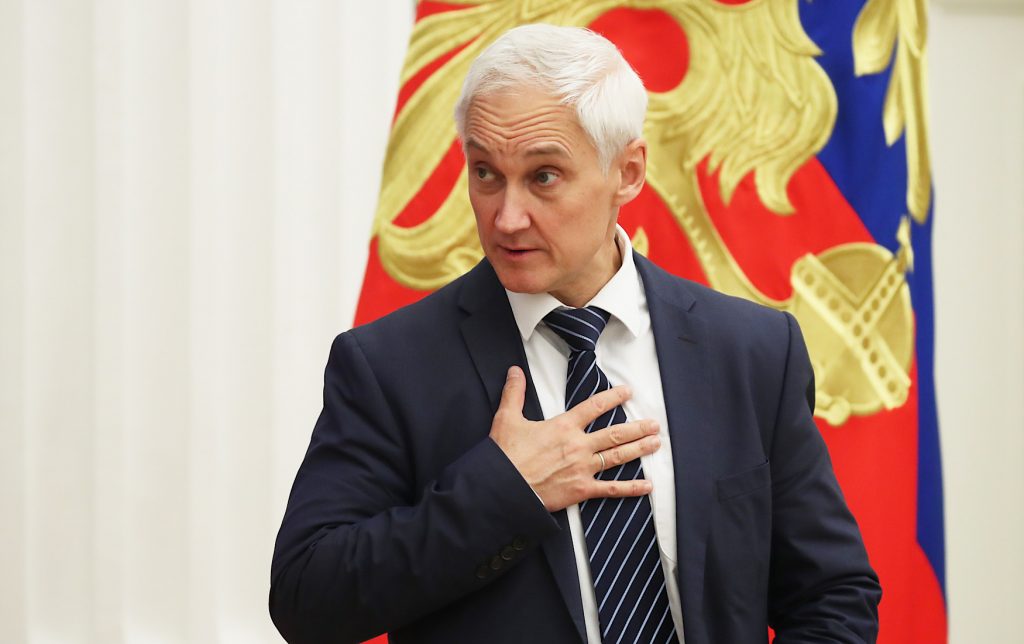
At the same time, many observers have already noted additional threats concerning the appointment for Ukraine. For example, Ukrainian economic expert Aleksey Kushch notes that after this appointment, everything is heading towards a sharp increase in the dynamics of the Russian military-industrial complex and an increase in military production in the Russian Federation: “For us, this is very bad news, since our ministerial positions are antipodes of Belousov’s policy with vulgar agenda liberalism during the war. You can evaluate the results yourself.”
One of the first conclusions of such a designation may be that the war (both in its actual and geopolitical manifestations) is gradually moving into a resource-based state. For this purpose, Putin decided to put at the head of the Ministry of Defense a person who knows how to manage resources and direct them in the right direction while predicting and analysing further actions. What such a decision will lead to will become apparent in the coming months, but it is too early to count on the collapse of the Putin system.
In his youth, Belousov studied combat sambo and karate (his coach later became vice-champion of Almaty). In recent years, he switched to athletic fitness and regularly goes to the gym. In 2007, as the Trinity Orthodox Newspaper reported, Andrey Belousov was baptised in the Church of the Kazan Icon of the Mother of God in the village of Puchkovo (his parents were atheists and did not baptise their children).
Andrey Belousov is interested in painting. “An interest in painting became an emotional outlet for my brother from intense intellectual studies. Andrey knows the history of the paintings as well as regular tour guides. He names Rembrandt among his favourite artists,” says Andrey Belousov’s brother, Dmitry.
Another hobby of Belousov is rock climbing. Not long ago, Vladimir Putin gave Belousov a book about the rock routes of Crimea.
Belousov is married for the second time. Nothing is known about Belousov’s first wife except that they have a son, Pavel (born in 1994). In the late 90s, he married journalist Larisa Vladimirovna Avdeeva (born in 1961). Nowadays, Larisa Vladimirovna manages the Slavic House company; construction, including roads and trade, are listed among the activities. In 2018, the couple declared 18.8 million rubles in income.
Belousov’s son, Pavel, graduated from the Bauman Moscow State Technical University. He owns Claire&Clarte, a company engaged in engineering consulting and digitalisation. The company’s owners (which officially has only three employees, but this does not prevent the company from receiving funds from the budget bypassing tenders) are Pavel Belousov and his wife Evgenia (nee Maryanskaya). The company’s clients include the Ministry of Industry and Trade of the Russian Federation and state corporations Rostec, Roscosmos and Rosatom. Pavel repeatedly got into scandals due to speeding.

